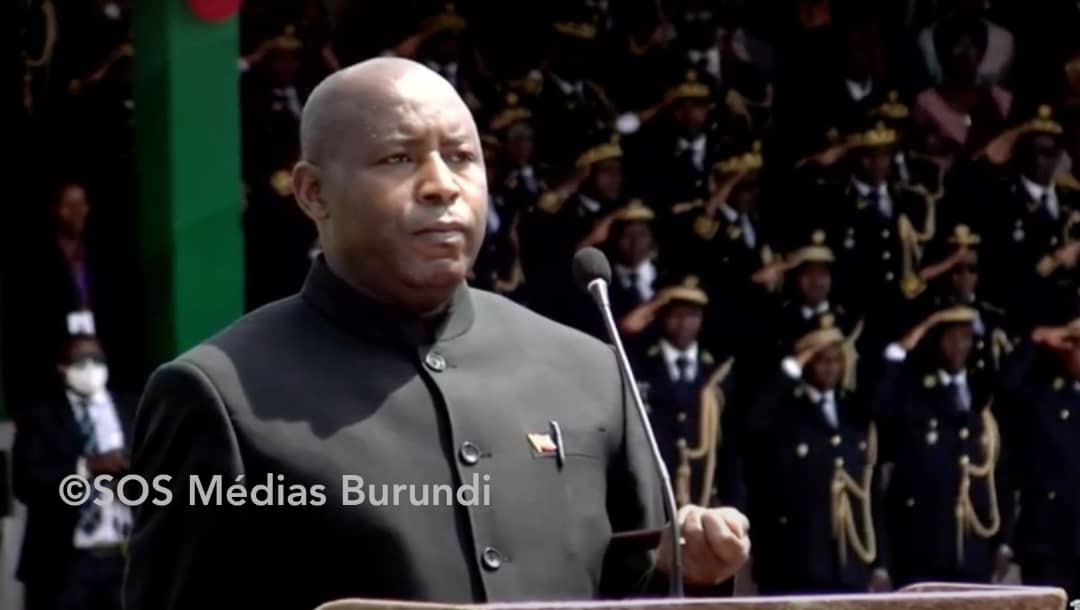Burundi : Ndayishimiye tightens his control with a reduced government and strategic returns

SOS Médias Burundi
Bujumbura, August 5, 2025 – A few hours after appointing Nestor Ntahontuye as Prime Minister, President Évariste Ndayishimiye unveiled, through his spokesperson Rosine Guilène Gatoni, the composition of a remodeled government. This smaller cabinet illustrates a desire for greater centralization of power while introducing some new figures.
The Ministry of the Interior, Public Security, and Community Development is entrusted to Léonidas Ndaruzaniye, whose appointment marks a refocusing on internal security in a context of recurring incidents.
At the Ministry of National Defense, Marie Chantal Nijimbere returns after a criticized stint at the Ministry of Trade, with Burundi being described as a « country of shortages and inflation, » with the fuel shortage being the most terrible, lasting a record 56 months. This transfer fuels debates about the government’s security strategy.
The Ministry of Justice, now expanded to include human rights and gender, is headed by Arthémon Katihabwa, a lawyer known for his close ties to the CNDD-FDD, who is expected to restore credibility to a sector regularly criticized.
External Relations, merged with East African Community Affairs, is headed by Edouard Bizimana, a former diplomat whose mission will be to relaunch relations with donors and regional partners.
At the Ministry of Finance, Alain Ndikumana takes over from Ntahontuye, with the challenge of stabilizing an economy hit by chronic shortages and inflation.
The Mines portfolio goes to Dr. Hassan Kibeya, whose appointment is expected to bring new momentum to the exploitation of mineral resources.
In Agriculture and Environment, Calinie Mbarushimana inherits a strategic sector for a country where food insecurity remains high.
Infrastructure and Transport are entrusted to Jean Claude Nzobaneza, responsible for reviving road projects and modernizing the network.
In National Education, François Havyarimana retains his position, a sign of continuity in this key sector for the country’s future.
Public Health remains in the hands of Lyduine Baradahama, reappointed to continue the health reforms underway.
The Ministry of Civil Service is assigned to Police Lieutenant General Gabriel Nizigama, a former chief of staff in charge of civil affairs recently ousted from power. His return symbolizes not only the recycling of former security pillars, but also the mischievousness of the head of state, who is redistributing positions to members of the circle of generals from the former Hutu rebellion. This strategy allows him to block any significant opposition, both within the ruling party and the security forces.
Sports and Youth are headed by Lydia Nsekera, a member of the International Olympic Committee since 2009 and President of the Burundi National Olympic Committee since 2017, a renowned sports personality tasked with revitalizing this often neglected sector.
Finally, Communication falls to Gabby Bugaga, who is tasked with ensuring control of government discourse in a tightly controlled media environment.
A smaller government, refocused power
President Ndayishimiye has abolished several ministries, including Trade and Solidarity, whose portfolios he will assume responsibility for himself. These reorganizations reflect a tightening of presidential control.
Despite the introduction of new faces, local and international observers believe that the CNDD-FDD’s influence remains omnipresent and that this reshuffle is primarily aimed at consolidating the power structure rather than initiating real reforms.

